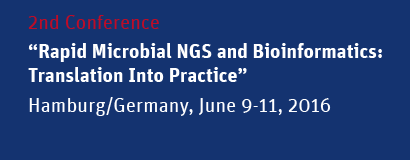News & Events
Real time genome sequencing of resistant bacteria ensures precise infection control in an institutional setting
The increasing prevalence of multidrug-resistant (MDR) bacteria is a serious global challenge. For...
PathoNGen-Trace Final Meeting
One last time before the the PathoNGen-Trace project comes to an end, the consortium gathered for...
Project
Next generation sequencing (NGS) has fundamentally altered genomic research. New developments will bring NGS costs and performance down to an everybody’s technology with extreme potential for ultra fast and accurate molecular typing and diagnostic as it provides the ultimative whole genome information.
However, technical and bioinformatics constraints restrict the application of NGS to few highly experienced laboratories. The goal of the project was the transition of NGS from a basic research tool to a highly efficient technology for pathogen typing and diagnostics on the EU level.
FP7
FP7 (Seventh Framework Programme for Research and Technological Development) was a key tool to maintain Europe’s leadership in the global knowledge economy. The programme ran from 2007 to 2013 and had a total budget of over € 50 billion. The core of FP7, representing two thirds of the overall budget, was the Cooperation programme. It fostered collaborative research across Europe and other partner countries through projects by transnational consortia of industry and academia.
The objective of the health research programme was to improve the health of European citizens, and increase the competitiveness and innovative capacity of European health related industries and businesses. Global health issues, like emerging epidemics, were also addressed.
This project has received funding from the European Union’s Seventh Framework Programme for research, technological development and demonstration under grant agreement No 278864.
More information at:
European Commission: FP7

